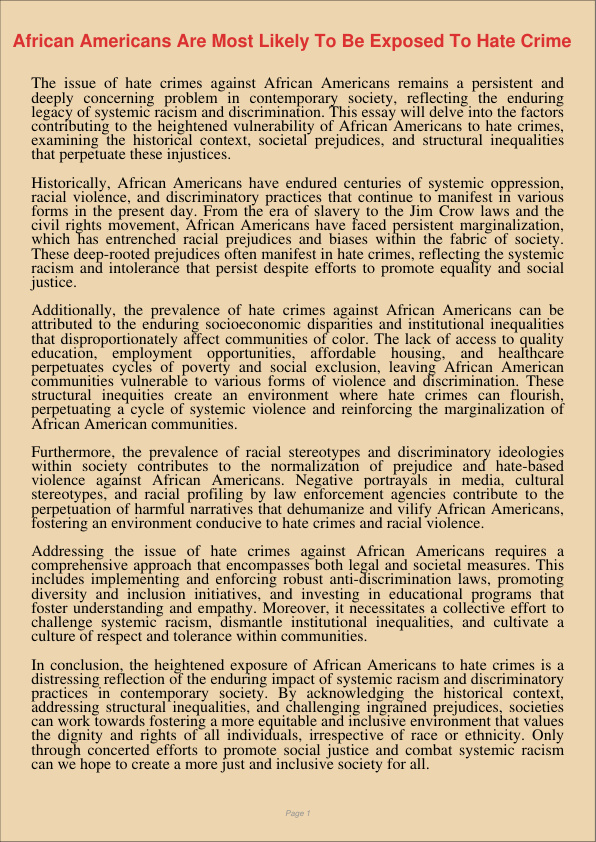African Americans Are Most Likely To Be Exposed To Hate Crime
Jan 6, 2024
hate crime
african americans
Other
Social science

The issue of hate crimes against African Americans remains a persistent and deeply concerning problem in contemporary society, reflecting the enduring legacy of systemic racism and discrimination. This essay will delve into the factors contributing to the heightened vulnerability of African Americans to hate crimes, examining the historical context, societal prejudices, and structural inequalities that perpetuate these injustices.
Historically, African Americans have endured centuries of systemic oppression, racial violence, and discriminatory practices that continue to manifest in various forms in the present day. From the era of slavery to the Jim Crow laws and the civil rights movement, African Americans have faced persistent marginalization, which has entrenched racial prejudices and biases within the fabric of society. These deep-rooted prejudices often manifest in hate crimes, reflecting the systemic racism and intolerance that persist despite efforts to promote equality and social justice.
Additionally, the prevalence of hate crimes against African Americans can be attributed to the enduring socioeconomic disparities and institutional inequalities that disproportionately affect communities of color. The lack of access to quality education, employment opportunities, affordable housing, and healthcare perpetuates cycles of poverty and social exclusion, leaving African American communities vulnerable to various forms of violence and discrimination. These structural inequities create an environment where hate crimes can flourish, perpetuating a cycle of systemic violence and reinforcing the marginalization of African American communities.
Furthermore, the prevalence of racial stereotypes and discriminatory ideologies within society contributes to the normalization of prejudice and hate-based violence against African Americans. Negative portrayals in media, cultural stereotypes, and racial profiling by law enforcement agencies contribute to the perpetuation of harmful narratives that dehumanize and vilify African Americans, fostering an environment conducive to hate crimes and racial violence.
Addressing the issue of hate crimes against African Americans requires a comprehensive approach that encompasses both legal and societal measures. This includes implementing and enforcing robust anti-discrimination laws, promoting diversity and inclusion initiatives, and investing in educational programs that foster understanding and empathy. Moreover, it necessitates a collective effort to challenge systemic racism, dismantle institutional inequalities, and cultivate a culture of respect and tolerance within communities.
In conclusion, the heightened exposure of African Americans to hate crimes is a distressing reflection of the enduring impact of systemic racism and discriminatory practices in contemporary society. By acknowledging the historical context, addressing structural inequalities, and challenging ingrained prejudices, societies can work towards fostering a more equitable and inclusive environment that values the dignity and rights of all individuals, irrespective of race or ethnicity. Only through concerted efforts to promote social justice and combat systemic racism can we hope to create a more just and inclusive society for all.